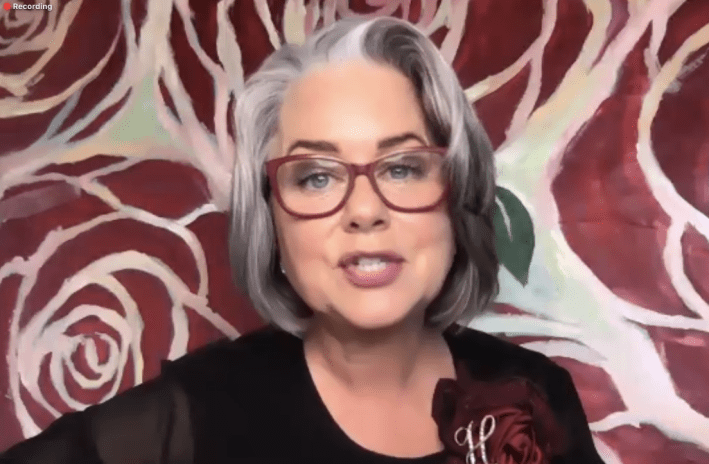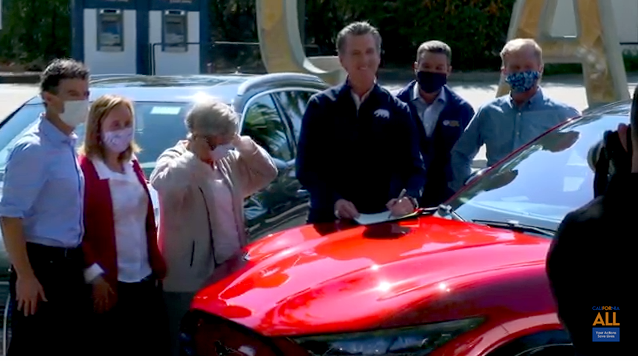As part of Climate Week 2020, California Governor Newsom today issued an executive order declaring the goal of eliminating fossil fuels from transportation, a sector that produces half of California's toxic and greenhouse gas emissions. The order calls for ending all sales of new fossil-fuel-powered vehicles in the next fifteen years, and calls on various state agencies to begin formulating regulations and strategies, and identifying actions and investments, to create a "just transition" away from reliance on fossil fuels.
While it set goals - which Newsom acknowledged "are nothing more than dreams with deadlines" - the executive order leaves the details to be worked out by agencies equipped to do so. For example, the Air Resources Board is tasked with developing regulations and strategies to reach the zero-emission goals.
The order directs the California State Transportation Agency, Caltrans, and the California Transportation Commission to, by July of next year, identify actions and investment strategies "to improve clean transportation, sustainable freight, and transit options." The order includes the building out of the statewide rail and transit network, outlined in the California State Rail Plan. It also, in recognition that zero emission vehicles are not enough by themselves, calls for the agencies to support "bicycle, pedestrian, and micro-mobility options, particularly in low-income and disadvantaged communities in the State, by incorporating safe and accessible infrastructure into projects where appropriate."
A broad range of organizations responded with support for the order, but also pushed the governor for more. ClimatePlan, for example, while applauding the announcement, pointed out that issues like racism and segregation, which shaped California’s current transportation system, must be more directly addressed. "California must invest in transportation planning and funding that centers the communities most impacted by climate change and racial injustice if it wants to achieve a more equitable and just transportation system," writes executive director Chanell Fletcher. There also needs to be more emphasis on making it easier for all Californians to safely walk, bicycle, and take transit, she adds, and land use planning must be included in any climate solution.
Elected Officials to Protect California held a press conference immediately before Newsom's announcement, calling on him to end all new extraction permits and to ensure setbacks around oil gas wells. "There was a 190 percent increase in permits in the first half of 2020 compared to 2019," said San Luis Obispo Mayor Heidi Harmon. "Governor Newsom is 'doing his utmost,' but he's not doing what he could and should to fight climate change," she said, calling on the governor to declare a state of emergency on climate change.

While the executive order makes no direct mention of oil-well permits, it includes direction to begin managing the closing down of the oil industry in California.
That, according to Newsom, is in line with the order's "core principles." The order directs several state agencies to develop, by next July, a "Just Transition Roadmap," following recommendations in a just-released state report on preparing the workforce for new jobs and industries as the oil industry is gradually eliminated. "We need a just transition to make sure those most affected by the transition are included in it," he said.
The question of buffer zones or setbacks around oil wells was the subject of a bill that was killed in committee in the most recent legislative session. The executive order doesn't make any particular recommendation about setbacks, instead requiring the state's Geologic Energy Management Division to create "a significantly strengthened, stringent, science-based health and safety draft rule" on the question. Newsom seems to be relying on the legislature to take this up again in its new session, which starts in January - the draft rule must be proposed by December. Newsom also seems to be leaving the issue of fracking to lawmakers.
A caller to the Elected Officials press conference asked about the jobs issue, claiming that "green jobs don't pay as well as oil industry jobs." Meghan Sahli-Wells, former Mayor of Culver City, responded that "there are a lot of jobs in remediating and dismantling old infrastructure and creating the clean energy that fuels us."
The creation of Oxnard's Clean Power Alliance agreement brought "lots of good-paying jobs," said Carmen Ramirez, Oxnard Mayor pro tem. "And we also got big community benefits from eliminating fossil fuel power plants - for example, cleaning up of the waterfront."
"We have the technology," she said. "The oil and gas industry is on its last... in a death struggle," she said, urging Newsom to "use his super power" to create the changes needed. "We are the ancestors that future generations will condemn or praise, depending on what we do today," she added.
California Environmental Justice Alliance saw "alarming contradictions in California’s path forward" in the order. "On the one hand, it sets an ambitious target for zero-emission transportation and reiterates a commitment to establishing health and safety protections for environmental justice communities," writes Executive Director Gladys Limon. "On the other hand, [it] also calls for investments in false solutions of low carbon fuels that could create a dangerous offramp that will hinder our progress, and fails to directly name critical protections like a buffer zone to protect frontline communities from unconscionable impacts of oil drilling in dangerous proximity.”
CEJA also pointed out the "glaring" omission of any direction to procure more clean energy and storage in frontline communities. This is particularly a problem as the state has recently been relying more on power from old fossil fuel plants to manage demand in the face of threatened power shut-offs. "The Administration must do everything in its power to accelerate the deployment of clean energy, storage, and distributed energy in frontline communities to replace fossil fuel generation and increase grid reliability and resilience," writes CEJA.
“There is no more time to waste," wrote Don Anair in a statement by the Union of Concerned Scientists. While Newsom's executive order is a "bold move," it's not enough and it won't happen fast enough. "The harrowing impacts of climate change are already affecting people and communities throughout the state. The science tells us those impacts will worsen in the years to come without making major changes to how we move people and goods."
The Sierra Club, EarthJustice, and the California Environmental Justice Alliance had asked for the governor to "stop permitting new oil and gas drilling, pipelines and infrastructure, and accelerate a managed decline to phase out oil production and refining in California, starting with operations near homes and schools."
They also asked for faster adoption of clean electricity for all energy uses, phasing out of dirty fuels in homes, a faster timeline for phasing out fossil fuel vehicles, and the appointment of strong climate leaders to regulatory agencies.
Other groups, including the Greenlining Institute and the Coalition for Clean Air, pledged to support the order and push for implementation of its goals.
But while environmental and environmental justice organizations were asking for stronger commitments from the governor, other groups immediately began to push back. Californians for Affordable and Responsible Energy, a lobbying arm of the Western States Petroleum Association, said it would be too expensive, and the California Trucking Association declared it would be downright impossible to implement.
At the press conference announcing the order, Newsom said it was wise to acknowledge that the global trend is towards clean energy and that those industries that don't get on board are "on the wrong side of history. They'll eventually have to recover, financially," he said, "but they'll also have to look their kids and their grandkids in the eye."
"Let us no longer be victims of geopolitical players," said Newsom, "Let us disabuse ourselves of the notion that [climate change] has to be our fate. It does not. We have the tools, we have the capacity, not only to lead but to create the regenerative mindset which is foundational to the health of this planet."
Newsom, in announcing the executive order, said it was just a beginning. "We're just getting started; there will be more executive orders, on a broad range of climate moves," he said.






